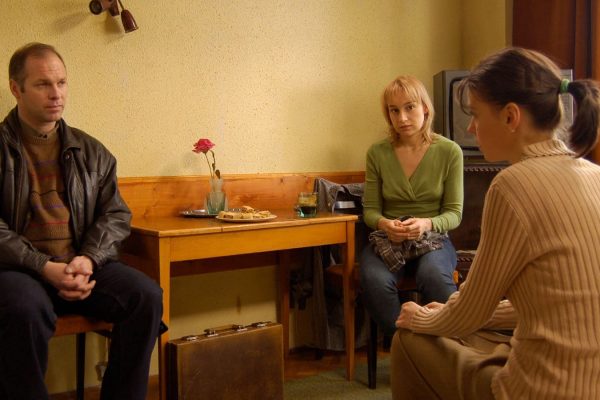Sexual pleasure is a surprisingly difficult thing to locate and understand. If someone likes something or derives pleasure from it, does that mean that it should no longer be subject to interrogation or critical attention? What does liking even mean? Getting off on it? Deriving emotional satisfaction from it? Investing in it as the basis for a relationship that brings joy and satisfaction?
Attempts to ask, and answer, these questions rarely take into account the fact that capitalism has fundamentally altered how people relate to each other, especially in their leisure time. Particularly in the United States, where I study sexuality and have a clinical practice, it is clear that our version of late-stage capitalism—shaped by rampant consumerism, each-for-him/herself neoliberalism, and a lingering anti-sex Puritanism—has limited and twisted our capacity for pleasure. It has done so in particular by stripping away any possibility that does not adhere with the mandates of labor. This focus on work is accompanied by the principle that power and class inequalities are inevitable. And if people must always work, always produce, always operate within and through the logics of capitalism, what happens to sex and sexuality? The answer varies, but in short: nothing good. This is especially acute for women, who suffer worse from the combined effects of capitalism and patriarchy, and whose sexuality and bodily autonomy have historically been treated with disdain.
Modern U.S. life includes a number of features that lessen people’s capacity for social relationships, including mind-numbing jobs, uneven shift work, punishingly long work hours, crazed connections to smartphones, soul-crushing commutes, low pay, and destructive coworker and customer interactions. The COVID pandemic has made these facets of people’s work lives seem all the more intolerable; the misery of the status quo has driven the Great Resignation and now many workers’ refusal to return to the office.
Still, however much workers may start to unravel the rather bleak conditions of their “work–life balance,” they nevertheless have become habituated to treat their social connections and intimate relationships more as commodities than as relations with intrinsic value. Capitalism intrudes upon, and infiltrates, seemingly noneconomic aspects of life, such as friendship, leisure, and family life. This impulse is exemplified by a New York Times’ advice column which recommended that people should maintain a wide network of “low stakes, casual friendships.” While the author says that such a network has been shown to bring happiness, all of the examples of how it does this are instrumentalist, such as maximizing job prospects.
U.S. capitalism also fundamentally alters the way people have sex—not just the who, what, why, and where, but down to the level of affect: joy, satisfaction, complaint, trauma, anxiety, and unease. In what follows, I outline nine ways that our particular brand of capitalism is destroying people’s sex lives, drawing on my experiences as a psychotherapist specializing in sexuality and as a women’s studies scholar.
This essay is featured in The Politics of Pleasure.
I. Aversion to Leisure and Rest
At the forefront of the capitalist assault on people’s sex lives is the fundamental aversion Americans have to leisure, and the sense of suspicion and distrust we have toward those who declare they will rest, play, or goof off. We have the least amount of paid vacation of workers in the Global North, and many U.S. jobs offer no paid time off. The rise of the gig economy has further limited the options that many workers have when they need rest or sick time. And, of course, even Americans who do have paid vacation time often do not take it. We are among the least likely to use our paid vacation, with almost half of U.S. paid vacation being forfeited. A study from 2013 found that people have become so accustomed to working and engaging in structured activities that they imagine leisure time as itself a source of intense stress.
We also try to squeeze more productivity out of the day than there are hours. We are among the least well-rested people in the developed world, averaging 6.8 hours of sleep per night, leaving 40 percent of Americans chronically sleep deprived. At least 30 percent of Americans sleep fewer than six hours each night, particularly manufacturing workers and those who work night shifts, such as transportation and health care workers. Sleep-deprived people have lives that start to fall apart: more accidents, conflict with families, declining work and academic performance, more cognitive and health problems, and less attention to sensuality, eating well, and relationships. We are becoming a nation of people whose employers believe that using the restroom is “wasted time.”
This normalization of round-the-clock, year-round work—where people prove their dedication to their jobs by overworking and not taking paid leaves, even when they have earned them—introduces a cultural framework where leisure is met with suspicion, contempt, and hostility. Women bear the brunt of this, expected to approach both their work and home lives as jobs, and as a result often end up working nonstop, all day long, in order to meet the demands of their employers and family.
This restlessness is often manifested as a “virtuous” suspicion toward pleasure and rest, meant to distinguish us from pleasure-loving Western Europe (e.g., Italy, Spain, Greece, France) and countries that build naps and rest into the day (e.g., the Philippines, Mexico, Costa Rica, Ecuador, Nigeria). This internalized distrust of pleasure has led to a variety of sexual symptoms that reveal the deep deprioritization of pleasure and the devaluing of slow-moving sex based on mutuality: we have less time for sex in general, so instead we have “quickies” or fast sex that is typically less pleasurable for women, and virtual sex instead of in-person sex. High percentages of Americans report using their phones while on the toilet (75 percent), in the shower (12 percent), at a place of worship (19 percent), and during sex (9–20 percent).
II. Orgasm as Producing a Product
Perhaps the most significant symbol of how the logic of U.S. capitalism intrudes upon and destroys our sex lives is the emphasis on orgasm as a product. Here, even the most pleasurable aspects of sex have become surprisingly laborious and tedious, more reminiscent of work than leisure. Sex has begun to mimic a corporate mentality that emphasizes the efficient control of workers’ behaviors in order to optimize productivity and minimize the time it takes to complete tasks.
Consider the astonishingly high rates of women faking orgasms (or, producing the “product” expected from sex): my previous work suggests that at least half of women have faked an orgasm, with a significant percentage saying that they faked often. When my research team asked why they faked orgasms, women described a plethora of reasons: fearing that their (male) partners would be hurt if they did not orgasm, fatigue, wanting the encounter to end, worries about feeling “normal,” fears and insecurity about sex in general, and wanting to increase their own arousal. The push to produce something has created an environment where women’s emotional labor during sex is expected in order to support their partners’ egos. Even women who did actually orgasm still reported surprisingly low rates of sexual satisfaction, often describing orgasm as “coercive,” suggesting that the quest to orgasm can be so cumbersome as to destroy the inherent pleasures of sex itself.
Couples in therapy not infrequently characterize orgasm as necessary for sex to even “count” as sex. “What’s the point otherwise?” is a claim I often hear. Sex without orgasm, or sex that does not purposefully drive toward orgasm as a goal, is less and less validated as good sex. In one of my recent studies, several women described feeling pressured to orgasm in order to validate the “work” and “labor” that their partners put into them, as if sex without this form of validation would be meaningless. Orgasm has become an expected product and outcome of sex rather than sex serving as a form of pleasure, connection, fun, or release.
III. Talking About Sex Rather than Having Sex
Our suspicion toward pleasure leads sex to become increasingly deprioritized. But because it cannot be fully displaced, it has been supplanted by talking about sex. As cultural theorist Michel Foucault writes, “We have at least invented a different kind of pleasure: . . . the specific pleasure of the true discourse on pleasure.” In other words, we enjoy talking about and thinking about sex more than actually having sex. The discourse proliferates, but sex itself does not.
There is an abundance of sexual imagery that pervades U.S. culture, including what sociologist Bernadette Barton has called the “pornification” of everyday life, which includes the rampant use of degrading and raunchy images of women in everything from ads to politics. Sexual content pervades all forms of media we engage with, yet people report a dwindling interest in having sex with partners. At the high end, Americans have sex 6–8 times per month. These numbers seem poised to decline as smartphone use and work hyperconnectivity increase.
In short, people value discourse about sex more than sex itself, which then allows sex to become a product sold, talked about, and imagined in the public marketplace. People make less and less room for sex in their lives, have less and less time to devote to it, and have less and less acknowledgment of its value to their lives in general.
IV. Insistence That Sex Is Dirty
Americans overwhelmingly fuse sex and “dirtiness,” as U.S. culture has insisted on this as the operating framework for its sexual politics. Indeed, many of our cultural institutions assume, and constantly reinforce, that sex is “filthy”—that this is its baseline truth. Many Americans hear sex discussed as “sin” weekly in their churches (particularly the trope of men being tempted by salacious women). Americans are more religious that anyone else in the Global North, and our churches expend immense energy to contain and control sexuality and to disparage queer sexualities, particularly for teenagers. Some churches sponsor chastity or purity balls, where girls and their fathers attend a wedding-like event, and the girl receives a ring from her father in exchange for a pledge of chastity until marriage. Schools, when they teach sex education at all, insist on teaching sex as risky, disease-ridden, and frightening, prone to violence, the spread of contagions, and devoid of pleasure. Or, more recently, as seen with the “Don’t Say Gay” laws in Florida, there is a collapsing of sex and sexuality such that any discussion of sexual identity is considered tantamount to giving children pornography or attempting to seduce them.
Dirtiness also informs how people formulate sexual fantasies, both during partnered sex and during masturbation. Women learn to fantasize about and eroticize their own lack of agency and power (e.g., being done to rather than doing things to others). Porn is rife with depictions of women that show them as objects of humiliation, degradation, and violence. Talking dirty—an expression that itself links sexuality and “dirtiness”—has also become an increasingly popular way to express sexual desire. Even studying these phenomena as a sex researcher carries the stigma of doing “dirty” work.
These examples collectively suggest that our ability to imagine sexuality outside of dirtiness and taboo has become severely limited. Black poet and critic Audre Lorde offered a distinction between the erotic and the pornographic. The erotic, she held, encompassed the life-sustaining and joy-producing qualities of sex, while the pornographic was power-based, emphasized inequality, and treated sex as dirty. Within this model, it seems clear that our cultural approach to sex lands solidly on the side of the pornographic. We are a culture of Internet sex and quick masturbation rather than one of powerful and slow sexual creativity.
This serves the interests of capitalism. If sex is dirty, people can only experience it as marked with disgust, shame, and taboo, and so sexuality gets cut off from other aspects of their lives—and can be sold back to them at a steep premium. Sex becomes a form of medication for some, obligation for others, mediated phenomenon for still others. People who expect little more from sex than that it be a brief relief will also tolerate pleasureless work lives and joyless office spaces. The more that people rely on mediated versions of their sexuality—through pornographic fantasies, or through powerful institutions that reinforce sex as dirty and bad—the more that sex becomes a force of regression and oppression rather than one of fulfillment, resistance, imagination, or possibility.
V. Dominance/Submission Dynamics
Capitalism insists that power imbalances must infuse erotic thought and experience, as much as they do every other aspect of life under itself. People have become so accustomed to power structures, hierarchies, and inequalities in their work lives that they now eagerly recreate those dynamics in their sexual lives as well. The permeation of dominance/submission dynamics—or the insistence that one person is in charge, and the other is not—perpetuates the idea that people cannot share power equally. Sex as a surrendering of power, or a taking of power, has become normative.
As a sex researcher and critical feminist scholar, I don’t raise this point to shame anyone about their particular desires, but rather to insist that there is no route to better sex as a culture that does not run through questions of why dominance and submission feels desirable to so many of us. I contend that sexual dominance/submission dynamics appeal in part because they reflect back to people what they experience in their everyday lives: a loss of equality, an insistence on submitting to increasingly poor (and underpaid) working conditions, an overvaluation of authority and the power elite, and humiliation as a condition of everyday lives.
U.S. capitalism offers working conditions that fundamentally strip the humanity away from people: they perform emotional labor, they do work without feeling invested in it, they feel tired and stressed out, they dislike coworkers and bosses (and rarely feel solidarity with coworkers against their bosses), they endure long commutes and difficult working conditions, and they have little creativity, autonomy, or control over their work lives. Capitalism normalizes dominance and submission, control of labor and time, and fundamental inequalities among and between people/workers. U.S. capitalism, in particular, requires working constantly to the point of exhaustion. This framework goes against mutuality, shared decision-making, connectivity, and pleasure between partners.
VI. Negativity Toward Emotions and Desires
Under capitalism, a good worker is one who has tight control over his or her emotions and does not show big feelings on the job. Efficiency and product-oriented thinking are prioritized, while emotions, affect, intuition, and desires are not. All of this leads to a certain type of alienation in which people engage in meaningless actions and feel estranged from any sense of feelings within themselves.
This equation also transfers into people’s sex lives. People avoid their emotions during sex or seek out sex without emotional connections. They look for (or tolerate) “friends with benefits” relationships where sex is “just sex,” or want open relationships where they will not have romantic feelings for other partners. Similarly, sex as sport, or the belief that emotions ruin or lessen sexual empowerment, have also shown up in how people think about sexuality.
A recent rise in the popularity of noncommitted relationships and relationships without emotional connections has created a number of problems for people’s sexual and emotional lives, particularly as people idealize emotionless sex and devalue emotional vulnerability. Research on friends-with-benefits relationships, for example, shows that they valorize traditionally “masculine” forms of intimacy (no emotions, no strings attached) while devaluing “feminine” approaches that emphasize emotional presence. Women in such relationships often feel more distress, guilt, and shame than do men. Though many people assume the opposite is true, in practice casual sex rarely offers a successful subversion of cultural norms and instead all too often reinforces traditional gender and sexual scripts.
Our culture does no better when it comes to fantasy and sexual desire in the abstract. Sex education programs do not typically even mention sexual fantasy as part of early sexual life, just as most partners do not regularly discuss sexual fantasies with each other. In therapy, my clients are not typically curious about where their fantasies come from, or what they might mean, instead choosing to analyze the behavioral or negotiating aspects of their sexual lives (e.g., how often they have sex with their partners and whether to initiate or agree to sex). The cerebral or imaginative/creative qualities of their sex lives are, more often than not, left out in the cold. This is yet another way that U.S. capitalism has influenced thinking about sexuality, reducing sex to mechanical bodies producing a product (orgasm) rather than envisioning sexuality as a part of creativity and humanness.
VII. Fusion of Sex and Consumerism
Capitalism teaches people that consumption is a necessary part of their everyday lives, and that they should direct all aspects of their lives toward the accumulation of more things. This infects people’s sex lives in numerous ways.
First, people allow pornography—a genre that largely lacks sexual creativity, especially mainstream pornography—to train and reinforce certain kinds of sexual fantasies and desires at the expense of all others. Common themes in pornography include women “servicing” men, violence against women, forced or coerced sex, stark power imbalances, role playing with women dressed as young girls, and racist imagery.
Second, people have increasingly turned to sex toys to help them fulfill or enhance their sex lives. This means that women increasingly masturbate using sex toys instead of their fingers, and partnered sex more often includes devices and gadgets meant to enhance sexual pleasure. Sex toys can change people’s sense of their sexual possibilities. In one of my recent studies on women’s masturbation, several women mentioned that they did not know how to masturbate without a sex toy, and that masturbating without a toy was unthinkable. Sex toys must be purchased—and many are quite expensive—which turns sexual pleasure into something that can only be achieved via commercial products. And, while feminist sex toy shops have grown in number and visibility, most sex toy shops do not openly embrace feminist politics.
Third, our leisure time—potentially time to rest, have sex, unwind, or socialize—has become increasingly shaped and molded by consumerism, in that people associate relaxation with consumption (e.g., shopping, traveling, beauty treatments). If relaxation becomes equated with buying things or consuming, our leisure time is then susceptible to corporate intrusions, the pressures of advertising, social comparisons with others, and the hazards of overspending. By contrast, people direct little time and attention toward the pleasures of rest, social interaction outside of consuming, face-to-face interactions, spending time in nature, or simply wasting time.
VIII. Sex Work Without Sex Workers
Under capitalism, imagining sex as work rather than play has permeated people’s sexual lives—and we all know that work is meant to be serious. Even actors in pornography rarely laugh, goof around, or seem to have any fun, despite the fact that porn began as a genre of humor. The link between sex and work appears in the cultural lexicon surrounding sex, thus providing a window into how language reflects the priorities and logic of capitalism. The terms “blow job” and “hand job” both imply that women who give men oral and manual sex are working. Traces of sex work and sexual labor show up in even the most mundane descriptions of sexuality, particularly the ways that women describe different kinds of sexual performances (e.g., moaning, showing enjoyment, mitigating damage to a partner’s ego) or different ways of displaying “authentic” sexual feelings.
Moreover, many feminists have started to think of “sex work” as including not just paid sexual labor but also the unpaid sexual labor that occurs in the mundane sexual relationships women have with men. What would it mean to acknowledge that nearly all sexually active women are engaging in “sex work”? If we broaden the conceptualization of “sex workers” to include those who associate sex with work—that is, those who labor to create sexual experiences for their partner, or those who think of sex as yet another chore—the notion of who engages in sexual labor expands considerably. Traces of sex work appear everywhere in women’s descriptions of their sexual lives, from explicit sexual exchanges (e.g., women giving husbands oral sex in exchange for them doing the dishes) to implicit notions of validating sexual labor (e.g., loudly moaning during sex to show that a partner’s sexual efforts had positive outcomes).
Conceptualizing all of this as “sex work” shines a light on how commonplace such labor is, and contextualizes more overt forms of sex work (e.g., for-pay sex work) as simply one small subset of a larger cultural pattern.
IX. Foreclosure of Sexual Possibilities
Perhaps the single most catastrophic way that U.S. capitalism destroys our sex lives is by foreclosing certain kinds of sexual possibilities. As feminist philosopher Avital Ronell writes in Stupidity: “Work makes people stupid, depriving them of essential types of nonproduction, leisure, meditation, play. It becomes ethically necessary to find a way rigorously to affirm nonworking, to subsidize rest, laziness, lolling around without succumbing to common criminalizations or devaluations of the logic of other ‘activities.’” Similar to the ways that capitalism makes it difficult to imagine other kinds of economic and social structures, sex in this culture lacks imagination. It becomes static, predictable, driven underground, quarantined to the bedroom, and cordoned off from other aspects of our lives. People stop asking what else sex could be, what else it could look like. They stop imagining differently.
The foreclosure of sexual possibilities—a process heightened by people’s traumatic experiences of the pandemic and the deep misogyny embedded in the recent loss of abortion rights—means that sex rarely works as a creative force but mostly serves as a regressive one. People cannot demand more of their sexual culture—movies, pornography, books, sex education curricula, schooling, partnerships, and more—because they, too, cannot imagine differently. We must make room for a sexuality full of rebellious impulses, creativity, inspiration, fervor, energy, and power, one that stands in opposition to capitalism. How could sex serve as a force that undermines or even destroys the oppressive institutions of our time?
People may never cultivate a sexuality entirely free—of cultural constraints, problematic and oppressive practices and structures, and inequalities—but we are already freer than we feel. If the COVID pandemic has taught us anything, it is that the rules are flimsy and easily breakable, that entire systems and structures can be toppled and rearranged, that people’s relationship to work and leisure can and must change. The fall of Roe v. Wade, too, has shown that rights are never inevitable, progress is a painfully jagged story, and that sex itself is always being shaped and molded by the forces of the day.
Could we imagine a sexuality that takes its time, loves leisure and fun and play, has no product or goal in mind, sees something else possible in partners and ourselves? Is there room for a sexuality that imagines that it is freer than it feels, that continually conjures something different? Can new forms of sexuality draw from new frameworks of justice and resistance? Can we make a defiant pleasure politics of bodies and sexualities that springs up from, rather than exists in denial of, the bleak political landscape of anti-abortion legislation, transphobic policies, anti-fat bullying, and anti-Black police violence? Can we ask of sex that it transforms the world rather than replicates the worst aspects of it? There is an urgency to this: to not allow U.S.-style capitalism to hollow out these sexual possibilities, to insist on something more.








